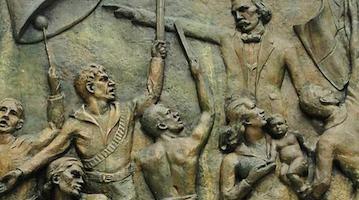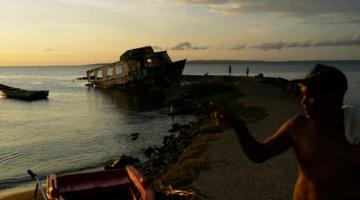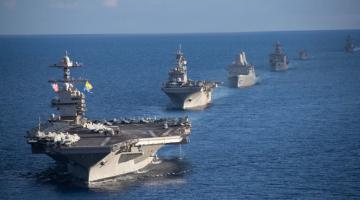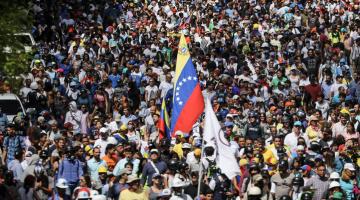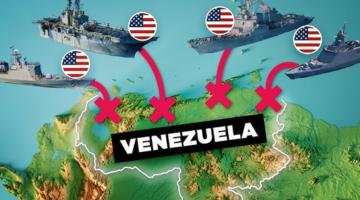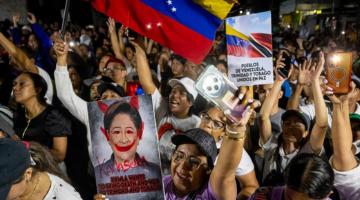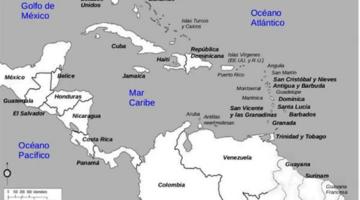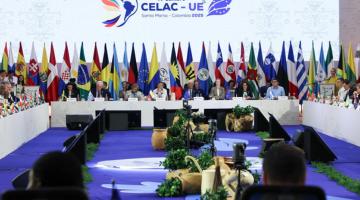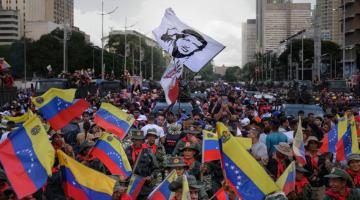Turning the Caribbean into a US bombing range requires local collaborators. Neocolonial governments have volunteered to play this role, betraying their people's right to peace and sovereignty.
The Caribbean region is a clearly militarized zone with the United States at the helm. Today’s militarization in the region is reminiscent of the kinds of earlier iterations, also led by the US, from the 1970s to the early 2000s.[1] The US Trump administration reportedly carried out a missile strike in the Caribbean on September 2nd under the pretense of combatting drug trafficking in the region. Based on video released by the US, the military strike utilized a drone and/or aerial bomb to target a boat that allegedly departed from Venezuela – which the US State Department accuses of being a “narco-trafficking organization” and not a state[2] – and purportedly contained non-specified drugs and 11 unidentified human beings (so-called “narco-traffickers.”)[3] The US did not provide any evidence for the allegations justifying these extrajudicial murders. The silence of Caribbean governments, their lack of condemnation and investigation of the attack, speaks for itself.
However, when discussing US militarization in the Caribbean – both past and present – we must recognize and acknowledge the complicity of Caribbean governments, as they have played a significant role in providing justifications and cover for US imperial machinations.
The Caribbean region has a long history of producing reactionary neocolonial governments with leaders who actively align themselves with US militarism – suiting the imperialist, capitalist, and racist demands of US global militarization. This history in the Caribbean is often overlooked in favor of the celebratory histories of revolutions against Indigenous genocide, African enslavement, Asian indentureship, as well as anti-colonial struggles for political independence. While the illustrious histories of struggle and revolution in the region are important, the unsavory histories of reactionary/co-conspirator Caribbean governments that align with US imperialism help us better understand the current political moment.
There are Caribbean governments today that enthusiastically support converting the Caribbean Sea into an active warzone, where US drone warfare and aerial bombing are not only acceptable, but cheered and presented as necessary. In this sense, these neocolonial governments consent to the US military buildup in the Caribbean and actively participate in shaping this regional militarism.
1983 or 2025? What direct U.S. military action in the Caribbean says about neocolonial Caribbean governments
The Caribbean governments’ lack of concern about – or celebration of – the U.S. military buildup in the region, especially the recent extralegal bombing and murder of civilians, while shameful and ludicrous, is not without precedent. For instance, though CARICOM critiqued then US President Ronald Regan in the 1980s about the economic aggression waged against the left-wing governments of Grenada, Cuba, and Nicaragua, many CARICOM member states continued to support US military buildup in the region. This demonstrated a divided regional community,[4] which ultimately paved the way for the US military ground invasion of Grenada in 1983 after the assassination of Grenadian PM Maurice Bishop. While many critics and experts in the 1980s condemned the US invasion of Grenada, there were no real sanctions against the US because of weak regional solidarity due to the number of reactionary governments in the Caribbean. In the pre-invasion period, these governments had called for increased US presence in the region to combat communist and left forces in their countries and to enact neoliberal policies of austerity. Prime Minister Eugenia Charles of Dominica even claimed that, “the United States presence in our region is not enough […] we are not your backyard, we are the front door, and you should help us to keep it clear.”[5]After the invasion and attack on Grenada, US military buildup in the region actually increased.
While PM Charles' reaction to US militarism is noteworthy given their appearance alongside US president Regan in the US White House press briefing room, there were many other notably complicit neocolonial Caribbean governments in the 1980s and 1990s. These Caribbean governments were subservient to the US and counterrevolutionary – actively sowing disunity in the region through their Western imperialist-aligned economic, political, and ideological world views. Those governments were: Eugenia Charles (Dominica), Tom Adams (Barbados), Edward Seaga (Jamaica), and John Compton (St. Lucia). Though Forbes Burnham (Guyana) opposed the US invasion of Grenada in 1983, his government’s assassination of Walter Rodney – a Caribbean anti-imperialist scholar and agitator that worked for Caribbean solidarity and internationalism – aided the wider counterrevolutionary and reactionary movement by governments in the region. All these governments also censored Black Power and communism in the region, which went hand in hand with the later adoption of neoliberal policies.
The similarities between the current US military buildup in the Caribbean, with sights on Venezuela, and the military buildup for the invasion of Grenada in 1983 are striking: First, there are international institutions and critics – part of a wider international environment – unable to hold the US accountable for violating any “international law” or treaties. Second, there are the Caribbean governments – in all their disunity – supporting US military buildup, but this time under the guise of “combatting drug trafficking.” This is a position one can only assume is taken with the hope of acquiring US investments in their individual countries. However, this was also an aspiration in the 1980s that did not come to pass for the majority of the smaller Caribbean states – including Dominica, the most vocal supporter of the invasion.
As well-meaning people attempt to leverage the fact of the Caribbean region being, in principle, a “Zone of Peace” and United Nations reporting that neither Venezuela nor the Caribbean are drug transit sites, we must also be clear that the US frequently disregards international law and UN reports. The US is currently engaged in genocide in Palestine, and, by both the input of CARICOM and the UN, the US has been allowed to introduce drone warfare, along with foreign mercenaries, into Haiti. The US does not care about war crimes, and it certainly does not care about human rights. The reported US military strike in the Caribbean is only made possible because many Caribbean governments have not taken any steps to defend their populations from US transgressions – and instead have worked to encourage US global authoritarianism.
It is this reactionary element among Caribbean governments today, not the progressive history, that we must contend with when we discuss Caribbean governments' roles in US militarism and imperialism in the region. CARICOM, as an entity, has engaged in openly chauvinistic behavior in the Caribbean, aiding US (and Canadian) imperialist racism against Haitians who have demanded for decades, the right to their own sovereignty, democracy, and self-determination.[6] It should not be lost on anyone that the security crisis in Haiti – enabled and maintained by US weapons, and used as pretext for the introduction of new military technologies such as drones and aerial bombs to the region[7] – is what made the reported US military strike in the Caribbean Sea feasible. In addition to the CARICOM states expressing support for pro-western positions that justify imperialist intervention and propagates securitization language weaponizing “safety” and “security,” we have also seen the CARICOM states – The Bahamas, Jamaica, Dominican Republic, Turks and Caicos, and many others – push anti-migrant policies and rhetoric towards Haitians, while contributing to the chaos in Haiti.[8]
Outside of Haiti, we have seen CARICOM states like Guyana make choices to subvert diplomacy between itself and Venezuela amid border tensions, by allowing US military buildup within its own borders. The excuse given by Guyana is that it needs to protect its oil and its sovereignty from Venezuela, even as the US has expressed its military intent for regime change in Venezuela.[9] The US has also designated Cuba as a state sponsor of terrorism and alleged that Cuban doctors throughout the Caribbean have been “trafficked” to perform forced labor throughout the region.[10] While Caribbean governments, reliant on Cuban doctors given lack of investments in social welfare in their own countries, have refuted these unsubstantiated allegations against Cuba by the US, this is due less to a shared solidarity and more about a specific need by these states for Cuban doctors. Afterall, they cannot expect to receive any investments in the healthiness of Caribbean populations by the US. This is why unsubstantiated claims about Cuban doctors are contested by Caribbean governments, while unsubstantiated claims about Venezuelan drug trafficking that requires regional bombing are not.
This to say: although it would be convenient to point solely to the success of US militarism and counterinsurgency in the Caribbean region, as to why there is a lack of solidarity and contestation against military buildup, how governments in the region respond to that counterinsurgency and militarism also matters. The truth is that there are many Caribbean governments that favor US and western imperialism. For instance, Caribbean states like Antigua have had its flag flown on a ship that brought weapons to Israel as it commits genocide in Palestine,[11] Barbados provided cover for Israel’s genocide in Palestine by ignoring the issue in its courts,[12] and Guyana snubbed its top development partner, China, to appease the US[13] – all while allowing US military forces in the country further inflaming disputes between itself and Venezuela.[14] And, while CARICOM members articulate adherence to principles such as “sovereignty” and the notion of the Caribbean region as a “zone of peace,” we cannot ignore their roles in fanning the flames of militarism in the region. For instance, by ignoring the role of Caribbean governments in the crisis faced by Haitians –which includes assisting the US in installing an illegitimate government, laundering myths about multi-national security “assistance” (as opposed to the reality of continued foreign meddling and the militarization of the country), and generally enforcing an imperialist agenda on Haiti – these neocolonial governments put the safety and practical security of everyone in the region at risk.
A CARICOM opposed to US militarism would reject participation in SOUTHCOM and its numerous exercises, like Tradewinds. A CARICOM opposed to US imperialism would take a regional stand to subvert US economic sanctions against those in the region and would be uncooperative with the US as it pushes regime change anywhere in the region.
In the event of US war against Venezuela, Caribbean neocolonial governments are accomplices
No one expected that a 2nd Trump presidency would see a reported US military strike on a boat in the Southern Caribbean. Nonetheless, like any militarist action abroad, the aggressor needs its accomplices. If a military strike was not feasible in the past, it was because the right accomplices and environment (thus critical juncture) were not present. For US President Reagan in 1983, the most vocal Caribbean accomplice was Dominica Prime Minister Eugenia Charles. Today, for US President Trump, the most vocal Caribbean accomplice is Trinidad and Tobago Prime Minister Kamla Persad-Bissessar. That both of these Caribbean women were in the strongest positions in their country advocating for US militarist aggression against states in the Caribbean region, further underscores the fact that one’s racial, gendered, sexual, religious, ethnic, and other identities do not and cannot prevent one from aiding a system reliant on racism, capitalism and imperialism.
On September 1st, the day before the reported military strike in the Caribbean, Prime Minister of Trinidad and Tobago Kamla Persad-Bissessar rejected claims by President Nicolas Maduro about the growing presence of US warships in the southern Caribbean Sea that aimed to target Venezuela.[15] In PM Persad-Bissessar’s own words at the time, “there is no evidence of any planned attack against Venezuela by the American navy.”[16] The very next day, on September 2nd, the US did carry out a military strike against a Venezuelan boat, to which PM Persad-Bissessar would respond on September 3rd in support of not only the strike, but also for the continued violent murders of alleged drug traffickers by the US military.[17] PM Persad-Bissessar’s quick message of support – for what was quickly deemed a summary execution in the southern Caribbean by the US government[18] – sought to clear the US of any wrongdoing. Though people expressed shock and disgust at the comments from Trinidad and Tobago’s PM – with some wondering whether she knew she had lied the day prior to the strike – PM Persad-Bissessar’s actions and responses are reminiscent of those by the former PM in Dominica, Eugenia Charles. PM Charles is notable for her role justifying, and providing ideological cover for, the US invasion of Grenada in 1983.[19]
Days after the reported strike, it was revealed on September 5th that CARICOM was preparing a letter to US Secretary of State Marco Rubio that would seek “assurances that the United States will provide advance notice of military operations that could affect the region, following growing unease over Washington’s escalating presence in Caribbean waters.”[20] Notably, the letter would underscore the “consensus among Caribbean governments on the need to confront drug and arms trafficking”[21] – which was the rationale given by the Trump administration for the reported strike in the first place. In the meantime, while CARICOM prepares its letter asking the US Trump admin to be more forthright about future military strikes that it plans to conduct in the Caribbean region, the US continues to deploy military assets – like fighter jets.[22] CARICOM's inability, or unwillingness, to do more speaks to its neocolonial position that shapes a wider regional reactionarism at a critical time when both global fascism, militarism, and anti-intellectualism (revisionism) are on the rise.
Besides CARICOM, other regional organizations, like the Community of Latin American and Caribbean States (CELAC), seem to be similarly incapable of responding to the current moment. Prior to the assertion that CARICOM was preparing a letter of assurance to the US, the president of Colombia, Gustavo Petro, shared that although “the vast majority of CELAC members” want peace in Latin America and the Caribbean, CELAC did not put out a statement “because a minority, which I add, opposed it.”[23] Those listed as opposing peace in the region were as follows: Argentina, Costa Rica, Ecuador, El Salvador, Guyana, Jamaica, Paraguay, Perú, and Trinidad and Tobago. It says a lot that 3 of the 4 founding states of CARICOM – Guyana, Jamaica, and Trinidad and Tobago – are listed in opposition to peace in the region. Barbados, the 4th founding member of CARICOM, was in support of a CELAC statement calling for regional peace. Here, we are talking about governments in opposition to peace as US bombs rain down without care about Caribbean populations. This also points to the role of neocolonial governments as mainly agents of US imperialism.
Commenting on the reported military strike whose victims are still undisclosed and the boat, which has not been retrieved and thus whose contents are still unknown, US president Trump stated while smirking:
“And if people want to have fun going on the high seas or the low seas, they’re going to be in trouble. I will tell you boat traffic is substantially down in the area […] You can imagine why. I think anybody that saw that is going to say, I’ll take a pass. I don’t even know about fishermen. They may say, “I’m not getting on the boat. I’m not going to take a chance.””[24]
Though Trump’s comment about the reported military strike and its impact on Caribbean fishermen is said in a laughing tone, it raises further serious questions about who and what the US military can target and bomb in the Caribbean Sea. Further, it was revealed that the US Trump administration was trying to come up with post hoc reasons for the reported strike in the Caribbean. And, as many pointed out that the strike itself constituted a war crime, US Vice President J. D. Vance declared on X (formerly Twitter): “Killing cartel members who poison our fellow citizens is the highest and best use of our military […] I don’t give a shit what you call it.”[25] So not only can anyone be targeted in the region – and this is what neocolonial Caribbean governments are supporting – but those targeted are undeserving of identification and any kind of process that could speak to the fact that they were a human.
Conclusion / Thoughts
What does it mean for these neocolonial accomplices in the Caribbean to support a US narrative wherein the country of Venezuela, home to almost 30 million people, is simply a “narco-terrorist organization” warranting random aerial bombardment? What does it mean to be an ally to the number one supplier of deadly weapons in the Caribbean region while decrying crime? What is the task or role of these neocolonial accomplices as the US endangers all life in the region? Today, for all we know, 11 fishermen or migrants could have been executed by the reported US military strike in the Caribbean. Venezuela’s Communication and Information Minister, Freddy Ñáñez, accused the US of releasing an AI generated video of the military strike.[26] This assertion shows that Venezuela will attempt to investigate any US military aggression in the region prior to retaliating back to aggression against itself, showcasing its own commitment to maintaining regional peace.
Nonetheless, Venezuela is surrounded by imperialist accomplice states – Guyana and Trinidad – opposed to peace. Additionally, while both the presidents of Colombia and Brazil have shared commitments to peace in the region given US aggression towards Venezuela, both of these states, outside of lengthy histories of US counterinsurgency within them, also aid US military buildup in the region[27] and have supported intervention efforts into Haiti.[28] It would be wise for Venezuela to seek out military allies who understand peace, not as silence in the face of US aggression and bombs, but peace as being in opposition to the destructive force that is US militarism and imperialism.
The truth is that we cannot talk about increased militarization in the Caribbean region, without also talking about how it has been welcomed by some of the Caribbean governments themselves, neocolonial in orientation and aligned with US imperialism and militarism.
Tamanisha J. John is an Assistant Professor in the Department of Politics at York University.
[1] John, Tamanisha J. “Exercise Tradewinds: 40 Years of U.S. Counterinsurgency in the Caribbean.” Black Agenda Report, February 14, 2025. https://www.blackagendareport.com/exercise-tradewinds-40-years-us-counterinsurgency-caribbean.
[2] U.S. Mission OAS. “UNITED STATES ADDRESSES THE SITUATION IN VENEZUELA.” January 24, 2025. https://usoas.usmission.gov/united-states-addresses-the-situation-in-venezuela/.
[3] LaSusa, Mike. “5 Things to Know About Trump’s Missile Strike in the Caribbean.” USA. Insight Crime, September 4, 2025. https://insightcrime.org/news/5-things-to-know-about-trump-missile-strike-in-caribbean/.
[4] Umoren, Imaobong. “Eugenia Charles, the United States, and Military Intervention in Grenada.” In Ideology in U.S. Foreign Relations. Columbia University Press, 2022.
[5] Ibid.
[6] Pierre, Jemima. “Why Is CARICOM Betraying Haiti on Behalf of the U.S.?” Black Agenda Report, March 6, 2024. https://www.blackagendareport.com/why-caricom-betraying-haiti-behalf-us.
[7] Côté-Paluck, Etienne, Manisha Ganguly, and Tom Phillips. “‘The Ground Shook’: Drone Attacks Help Haitian Government Wrest Control of Capital from Criminal Gangs.” Haiti. The Guardian, July 2, 2025. https://www.theguardian.com/world/2025/jul/02/haiti-port-au-prince-drone-attacks-gangs.
[8] UN Committee on the Elimination of Racial Discrimination. “Stop Deporting Haitians: Rights Experts’ Appeal to Countries in Americas.” United Nations, April 28, 2023. https://news.un.org/en/story/2023/04/1136192.
[9] Misión Verdad. “United States Is Converting Guyana into a Military Enclave.” Orinoco Tribune, December 15, 2024. https://orinocotribune.com/united-states-is-converting-guyana-into-a-military-enclave/.
[10] Duncan, Natricia. “Caribbean Leaders Deny US Claims That Cuban Health Workers Are Victims of ‘Forced Labor.’” Caribbean. The Guardian, March 26, 2025. https://www.theguardian.com/world/2025/mar/26/cuban-health-workers-trump-human-trafficking.
[11] MEMO. “Antigua-Flagged ‘Genocide Fleet’ Delivers Explosives to Israel.” Middle East Monitor, June 26, 2025. https://www.middleeastmonitor.com/20250626-antigua-flagged-genocide-fleet-delivers-explosives-to-israel/.
[12] Joseph, Emmanuel. “Justice Wells Says Gaza Genocide Case Has No Legal Merit.” Local News. Barbados Today, June 8, 2025. https://barbadostoday.bb/2025/08/06/justice-wells-says-gaza-genocide-case-has-no-legal-merit/.
[13] Wilkinson, Bert. “Guyana in Middle of US-China Cold War.” Guyana. Caribbean Life, March 28, 2025. https://www.caribbeanlife.com/guyana-in-middle-of-us-china-cold-war/.
[14] John, Tamanisha J. “Guyana, Beware the Western Proxy-State Trap.” In The Diaspora. Stabroek News, December 25, 2023. https://www.stabroeknews.com/2023/12/25/features/in-the-diaspora/guyana-beware-the-western-proxy-state-trap/.
[15] Tack, Clint Chan. “PM Denies US War Plot, Says Naval Buildup Is for Drug Interdiction, Not Invasion of Venezuela.” Trinidad and Tobago Newsday, September 2, 2025. https://newsday.co.tt/2025/09/02/pm-denies-us-war-plot-says-naval-buildup-is-for-drug-interdiction-not-invasion-of-venezuela/.
[16] Ibid.
[17] Williams, Laurel V. “Kamla Says ‘kill All Traffickers’ as Trump Claims ‘Lethal Strike’ on Venezuelan Drug Boat.” Trinidad and Tobago Newsday, September 3, 2025. https://newsday.co.tt/2025/09/03/kamla-says-kill-all-traffickers-as-trump-claims-lethal-strike-on-venezuelan-drug-boat-2/.
[18] Wilkins, Brett. “Experts Decry US ‘Summary Execution’ of Alleged Drug Runners Off Venezuelan Coast.” Common Dreams, September 3, 2025. https://www.commondreams.org/news/trump-attack-off-venezuela-illegal.
[19] Umoren, Imaobong. “Eugenia Charles, the United States, and Military Intervention in Grenada.” In Ideology in U.S. Foreign Relations. Columbia University Press, 2022.
[20] NY Carib News. “CARICOM to Seek Assurances from U.S. on Military Operations in the Caribbean.” Regional. NY Carib News, September 5, 2025. https://nycaribnews.com/caricom-to-seek-assurances-from-u-s-on-military-operations-in-the-caribbean/.
[21] Ibid.
[22] Trinidad and Tobago Guardian. “Trump Deploys 10 F-35 Fighter Jets to Region.” September 6, 2025. https://www.guardian.co.tt/news/trump-deploys-10-f35-fighter-jets-to-region-6.2.2393513.2d18a33a0f.
[23] 1. Gustavo Petro, “This is the statement from the vast majority of the members of CELAC, who sign for peace in Latin America and the Caribbean.,” @petrogustavo, September 4, 2025, https://x.com/petrogustavo/status/1963789485843583246.
[24] Anselm Gibbs, “NEW: US President Trump says there’s been a drop in boat traffic in the southern Caribbean after deadly US military strike.,” Tweet, @AnselmGibbs, September 5, 2025, https://x.com/AnselmGibbs/status/1964073952633848292.
[25] NDTV News Desk. “‘Don’t Give A Sh*t’: JD Vance Dismisses Critics After 11 Killed In US Strike.” World News. NDTV World, September 7, 2025. https://www.ndtv.com/world-news/dont-give-a-sh-t-jd-vance-dismisses-critics-after-11-killed-in-us-strike-9230839.
[26] Merco Press. “Caracas Claims Video of Exploding Boat Was AI-Created.” September 3, 2025. https://en.mercopress.com/2025/09/03/caracas-claims-video-of-exploding-boat-was-ai-created.
[27] U.S. Southern Command Public Affairs. “SOUTHCOM Commander Visits Colombia, Brazil.” U.S. Southern Command, September 12, 2022. https://www.southcom.mil/MEDIA/NEWS-ARTICLES/Article/3154200/southcom-commander-visits-colombia-brazil/.
[28] Blaise, Juhakenson. UN and OAS Support Haiti’s Security with Station Renovations and New Police Vehicles. Haiti. August 4, 2025. https://haitiantimes.com/2025/08/04/un-oas-renovate-haiti-police-stations/.

